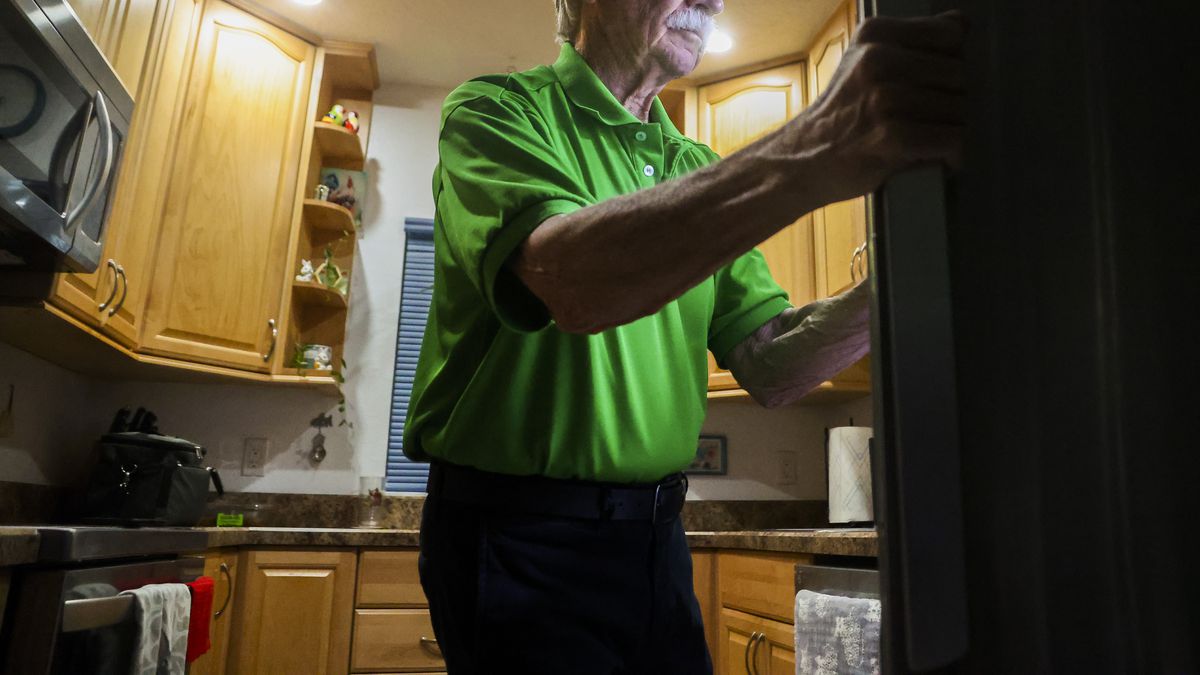Larry Gesick failed to hear his alarm at 5 a.m., prompting his wife to wake him. Thirty minutes later, he left for work, dressed in a green polo with his lunch cooler in hand. While most neighbors were still asleep, Gesick made his way to his car under the dim glow of street lamps and moonlight. At 77 years old, a Vietnam veteran, and a great-grandfather of two, Gesick belongs to the rapidly expanding age group of individuals aged 75 and above who are actively participating in the workforce.
On that particular morning in March, Gesick’s destination was Publix, where he would spend his day laboring. Carrying a lunch cooler filled with cheese, crackers, and a protein shake for breakfast, Gesick embarked on his daily routine of stocking shelves with various items like salads, organic juices, bananas, potatoes, and pears.
The decision for seniors like Gesick to continue working stems from a mix of practicality and necessity. With the rising costs of essential expenses such as medical bills, mortgages, and food, many older individuals find themselves compelled to work to make ends meet. The fixed incomes and dwindling savings are no longer sufficient to cover the escalating expenses, leaving them vulnerable to financial instability and the looming threat of being unable to afford assisted living in case of sudden health deterioration.
The Gesicks, originally from Arizona, relocated to Florida in pursuit of a more serene lifestyle near the water and closer to Joyce’s daughter. Despite initial plans for a peaceful retirement supported by Larry’s military pension and Joyce’s social security, financial challenges began to surface as the cost of living surged unexpectedly. Groceries, car insurance, and condo association fees all contributed to their financial strain, pushing them to reconsider their retirement plans.
The narrative of seniors rejoining the workforce is not unique to the Gesicks. Across the country, older adults are increasingly opting to work in various capacities to sustain their livelihoods. Factors such as longer life expectancies, inadequate savings, and a lack of financial security are propelling individuals towards extended periods of employment well into their later years.
In Florida, the trend of seniors returning to work is exacerbated by environmental factors like escalating insurance rates due to worsening storms and soaring housing prices driven by an influx of out-of-state residents. The financial burden imposed by these circumstances, coupled with the absence of substantial retirement savings, compels individuals like John DeCotret, Denise Eberius, and Cindy Burns to reenter the workforce to maintain their standard of living.
For Joyce Gesick, the decision to resume working remotely for a legal agency carries a tinge of embarrassment. Despite their efforts to make prudent financial choices, the Gesicks find themselves grappling with the consequences of insufficient savings and unforeseen expenses. The daily routine of working from home serves as a constant reminder of the financial uncertainties they face and the time slipping away.
As the Gesicks navigate the challenges of balancing work and personal life, they cling to the hope of eventually retiring again once their financial obligations are met. The prospect of settling their debts and achieving financial stability offers a glimmer of optimism amidst the struggles of their daily reality.
